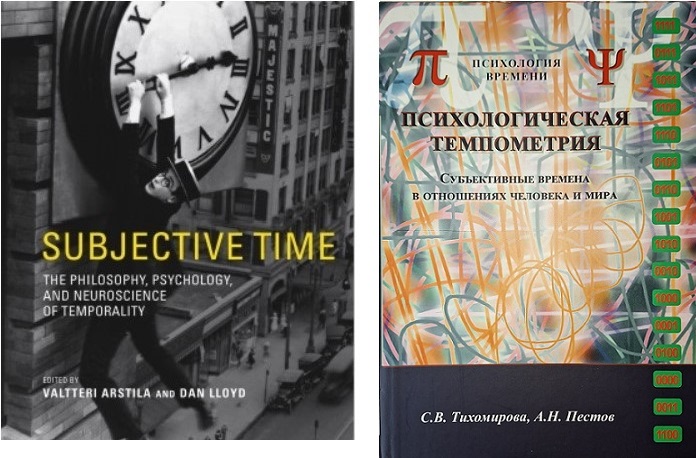Contemporary researches of subjective times
Nature is not hurries to reveal its secrets. The researchers who are investigating that subject have to act to the accompaniment of nature's resounding laughter of over the human mind. It takes courage, physical and mental strain to study a tenuous basis of human existence, the time. Nature makes fun of new-come scientists: here are another ones with a hope to discover something after Hilbert, Minkowski, Fridman, Einstein (those who managed to find out that space and time themselves are doomed to become fictions, and only a certain unity of them both retains an objective reality), after Gödel who put in doubt the existence of objective time and believed that time is subjective and that it is an illusion.
Penetration into the nature of time is continuing.
How Marc Wittmann remarks: “A large number of competing models exist for how the brain creates a representation of time”. https:/sites.google.com/site/webmarcwittmann/Home
Simon Grondin, Université Laval, remarks: “Indeed, myriad theoretical explanations make no mention of a central mechanism that is dedicated to the processing of temporal information. For instance, researchers with a cognitive background have described time perception in terms of cognitive mechanisms, without referring to the idea that there is an internal clock (see Block, 2003; Block & Zakay, 2008)”. Timing and time perception: A review of recent behavioral and neuroscience findings and theoretical directions.

The Book 2014 г. "Subjective Time" +"The Tempometry", 2025, = 1
The Book 2025. Psychological Tempometry
Matrix representation in psychology, 2025:

Several surveys best of all had been thrown light on state contemporary researches.
That is 125th Anniversary Article “The Psychology of Time: A View Backward and Forward”, P.A.Hancock and Richard A.Block.
Impressive review “How cognitive load affects duration judgments: A meta-analytic review” Richard A.Block, Peter A.Hancock Dan Zakay.
“The experience of time: neural mechanisms and the interplay of emotion, cognition and embodiment” by Marc Wittmann and Virginie van Wassenhove
Klochko V.Е., Krasnoryadtseva O.M., Khvan N.V. INDIVIDUAL PSYCHOLOGICAL CHARACTERISTICS OF TWO TYPES OF CHRONOTOPICAL ORGANIZATION OF HUMAN LIFEWORLD. Bulletin of Kemerovo State University. 2015;3(3):148-154. (In Russ.)
Resume: The paper focuses on the complex, non-linear nature of relations between the parameters of value-semantic sphere and features of human temporal perspective. Time perspective and value-semantic dimensions of human life-world are considered in their interdependence with each other within a holistic process of life-fulfillment, in relation to which they act as “cross-cutting” symptoms; for this purpose individual characteristics of this relations are defined by features of human chronotopic organization. The time perspective, considered in unity with value-semantic dimensions of human lifeworld, is revealed in a new meaningful composition (which includes the meaning of life orientation, existential performance, basic beliefs, meaningful goals) acting as an element in the structure of higher-transspective life-fulfillment. On the basis of empirical data, typological methods of chronotopic life-world organization are identified and described. It is shown that the features of time perspective and value-semantic characteristics, that are consolidated in the image of the person’s world, are associated with their preference for one or another field of employment as one of the basic components of adult lifestyle. The paper demonstrates empirical evidence that awareness and harmonization of temporary locuses of value and semantic parameters gives a person a real opportunity to find their “inner center”, switch to selfdetermination and choose an emotionally rich, meaningful live.
Keywords: time perspective, value-semantic dimensions, human lifeworld, chronotopical organization.
Neuroscience: BOUQUET OF EAGLEMAN LABORATORY
John Wearden. Wearden's research work (more than 120) - Seeing Further Information tab for an extended publication list.
Alan Miles Wing. Interpersonal synchronization of subjective times
